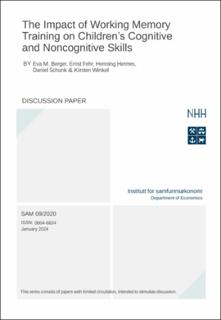The Impact of Working Memory Training on Children’s Cognitive and Noncognitive Skills
Working paper
Permanent lenke
https://hdl.handle.net/11250/2657279Utgivelsesdato
2020-06-08Metadata
Vis full innførselSamlinger
- Discussion papers (SAM) [657]
Sammendrag
Working memory capacity is thought to play an important role for a wide range of cognitive and noncognitive skills such as fluid intelligence, math, reading, the inhibition of pre-potent impulses or more general self-regulation abilities. Because these abilities substantially affect individuals’ life trajectories in terms of health, education, and earnings, the question of whether working memory (WM) training can improve them is of considerable importance. However, whether WM training leads to improvements in these far-transfer skills is contested. Here, we examine the causal impact of WM training embedded in regular school teaching by a randomized educational intervention involving a sample of 6–7 years old first graders. We find substantial immediate and lasting gains in working memory capacity. In addition, we document relatively large positive effects on geometry skills, reading skills, Raven’s fluid IQ measure, the ability to inhibit pre-potent impulses and self-regulation abilities. Moreover, these far-transfer effects emerge over time and only become fully visible after 1213 months. Finally, we document that 3–4 years after the intervention, the children who received training have a roughly 16 percentage points higher probability of entering the academic track in secondary school.
